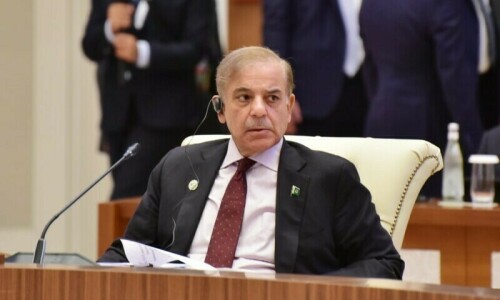ISLAMABAD, March 26: The collapse of communities and the normative system they sustained are the key factors that have contributed to the growth of mass violence in societies particularly in South Asia, says an Indian expert.
“Violence and non-violence both exist in the same person as human potentialities. But those who feel they have been let down by the present global system and have no future within it invoke violence and terror. Unfortunately, this feeling coupled with the world’s inability to understand the causes have been acquiring a dangerous edge in recent times,” said Ashis Nandy, an Indian political psychologist and sociologist at the Centre for the Study of Developing Societies, New Delhi
He was delivering a lecture on “terror, counter-terror, self- destruction: living with the regimes of narcissism and despair” organised by the Sustainable Development Policy Institute (SDPI) on Wednesday.
Elaborating his view he said social flux and moral anomie had psychologically disoriented large sections of people and generated in them a vague sense of loss, anxiety and anger. They lived with a sense of loneliness and a feeling that the vocations, religious life and ethics they had known were all being invalidated by their changing lifestyle.
Since the meaning of life had been taken away from them but not the meaning of death so they were invoking violence and terror to become audible and visible, he said citing the example of Palestinians, Buddhist monks of Thailand, Sri Lankan and Pakistani suicide bombers.
On the other hand, Nandy explained, terror had been an instrument of statecraft, diplomacy and political advocacy for centuries. To see it as a new entrant in the global marketplace of politics was to shut one’s eyes to the deep human propensity to hitch terror to organised, ideology-led political praxis.
This propensity had also enjoyed a certain ‘natural’ legitimacy in the dominant global culture of public life when it came to the serious business of international relations. Despite recent pretensions, in international politics violence did not have to be justified; only non-violence had to be.
The mainstream global culture of statecraft insisted that the true antidote to terror was counter-terror. In that respect, the killers who struck at New York on 9/11 and the regimes that claimed absolute moral superiority over them shared some common values. Both believed that when it came to Satanic others, all terror was justified as long as it was counter-terror and interpreted as retributive justice. Both looked like a belated product of the twentieth century, which in retrospect looked like a century of terrorism and its natural accompaniment, collateral damage. Guernica, Hamburg, Dresden, Nanking, Tokyo, Hiroshima and Nagasaki were all formidable names in the history of terror and counter-terror, used systematically as political and strategic weapons, he said.
Nandy said that only by engaging with these experiences and the associated suffering that it would be possible to battle the worldviews or ideologies that organized these experiences into a work plan for terror. However, unwillingness to negotiate these life experiences or empathising with the suffering, consistent denial of their existence, legitimacy and the normal human tendency to configure such experiences into something ideologically meaningful, contributed and aggravated the sense of desperation and abandonment for many.
He further added that when we refused to recognize these experiences or sought to delegitimize them, we pushed the desperate and the abandoned towards a small, closed world of likeminded people who constituted a ‘pseudo-community’ of those whose rage and frustration aware sometimes free-floating but always seeking expression in desperate self-destructiveness masquerading as self-transcending martyrdom.
The self- transcendence may be questionable but the desperation was not, he concluded.













































Dear visitor, the comments section is undergoing an overhaul and will return soon.